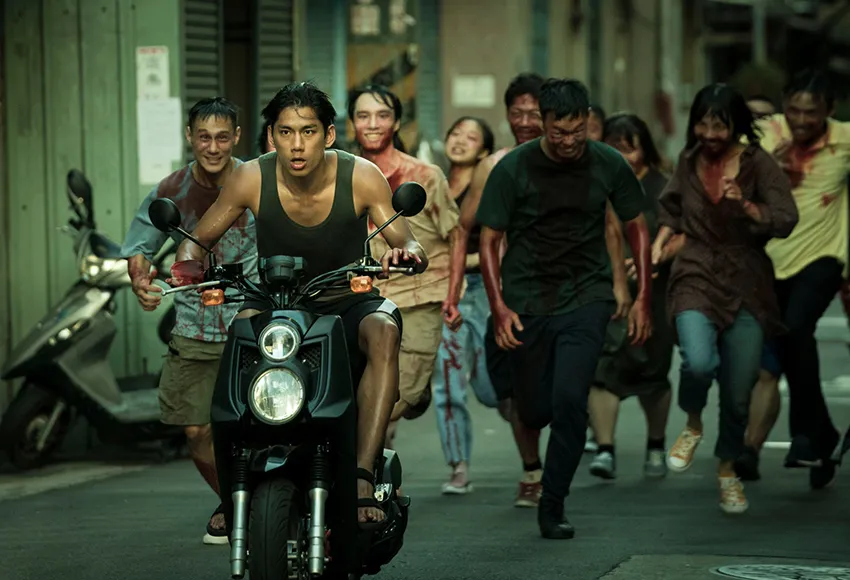THE SADNESS
Shudder
The Sadness is one of the more aggressively bleak, disturbing, and depraved horror films I've ever seen. While I know that sounds like hyperbole, trust me when I say it is not. The feature-length debut for writer-director Rob Jabbaz is a descent into gore-drenched madness that sticks to the soul like glue and in the process generates an aura of disgusting malice I found almost impossible to shake afterward.
But it's also impeccably well made and features some exquisite suspense sequences that had my pulse racing and the hair on my arms anxiously standing at attention. The film also features a phenomenal performance from star Regina Lei. The actor grounds the proceedings, crafting a portrait of resilient, empathetic decency courageously bursting forth under the yoke of unimaginable human depravity that I became increasingly enamored with as events progressed.
The morning begins like any other for Jim (Berant Zhu) and Kat (Lei). They wake happily entwined in one another's arms. Their neighbors are going through their typical daily motions of watering balcony plants, taking out the trash, and other such activities. The local newscast urges viewers to keep taking the viral epidemic that's held Taiwan seriously in its grasp for over a year even though the majority of those stricken by the puzzling disease have thankfully only had to deal with relativity benign, flu-like symptoms.
That all changes after the pair go their separate ways for the day: Kat on the subway into the heart of the city for work, and Jim to the neighborhood's breakfast café for a cup of coffee and some pleasant conversation. Each is horrified to discover that this virus isn't as harmless as they've allowed themselves to believe. Instead, thanks to the seeming indifference of the government and the majority of the populace bullheadedly refusing to follow simple safety protocols – like wearing a face mask in public – it has been silently allowed to mutate into something unspeakably lethal.

And what does this mutation do to the newly infected? Well, for anyone who's seen 28 Days Later... or Train to Busan, the answer won't come as a gigantic surprise. People become unstoppable killing machines, ripping to shreds anyone and everyone they encounter with carnal fury. They pass on their disease with their bodily fluids, whether through a bite, vomit, blood splattering into an open wound, and even forced sexual intercourse.
In short, it's the end of the world as Jim and Kat know it, with the pair fighting to survive in the desperate hope they'll be reunited before they're either dismembered by the raging hordes roaming the streets and the immediate countryside, or instead transformed into unthinking, cannibalistic marauders themselves. It's a fast-paced race against time, the only questions being how shockingly extreme Jabbaz is going to make things for the young lovers and whether or not he's going to allow either to survive to this story's conclusion.
What's interesting about this particular virus is that it doesn't turn the infected into zombies. Instead, it appears to wipe away all sense of self-control and any semblance of decency. The afflicted become hedonistic monsters who revel in violence and are in a constant search of sexual fulfillment. Primal instincts take over, and everything else that makes a person who they are – their fears, insecurities, peculiarities, sensitivities, and any semblance of human kindness – is instantaneously obliterated.
Another intriguing aspect is how Jabbaz depicts the violence. Make no mistake, this is an exceedingly bloody and gruesome motion picture. An early subway massacre drowns the screen in gore, and even for someone like me – who feels like they've seen it all – there are some images during this sequence that left me shaking.
But while the early portions are unrelentingly graphic, as the narrative narrows its focus onto Kat and her struggles to persevere, Jabbaz cleverly pulls back – at least somewhat – on just how much grisly viscera he wants to show. He understands that, mainly because of how graphic things were initially, the viewer's imagination will produce images far beyond anything he and his talented effects team could have conceived of themselves.
This has the intended effect of making the picture even more unbearable than it otherwise would have been during several key moments. This is especially true in regards to a quiet, unnamed businessman (portrayed with shrewd, unhinged moxie by Taiwanese television star Tzu-Chiang Wang) who becomes especially infatuated with Kat after he becomes infected. He does some things I cannot begin to describe, most of them so beyond the pale that there are no words to illustrate how abhorrently vulgar they are.
Let me be clear: The level of physical and sexual violence is roughly nine circles beyond anything that would normally be labeled as "extreme." It is a sickening hellscape of cold-hearted perversity and apocalyptic dehumanization. While there is a strong, emotionally heartfelt dynamic lurking at the heart of Jabbaz's screenplay, and although Lei is flabbergastingly great and the overall filmmaking is excellent, none of this is for the faint of heart. I admire what the director has accomplished more than I enjoyed his finished product. The Sadness is a merciless nightmare of societal self-destruction I don't think I could watch again even if I wanted to try.


